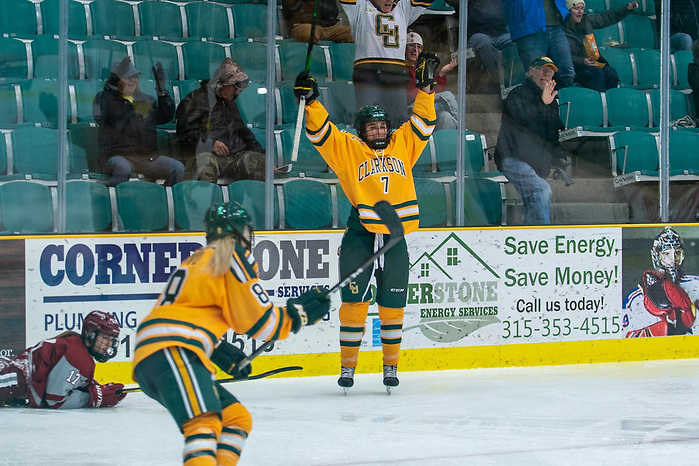
It’s been a transitional year for the Clarkson Golden Knights. Last season, they made their fourth straight Frozen Four and they had the top scoring line in the country. Loren Gabel won the Patty Kazmaier Award and she was second in the country with 69 points, just behind her partner in most of the scoring, Elizabeth Giguere, who finished with 73 points. Linemate Michaela Pejzlova’s 55 points were good for fifth in the nation.
But Gabel graduated and Giguere is on a new line and in a new role. She excelled as the set-up woman for Gabel, demolishing the Clarkson career record for assists just 100 games and 2.5 years into her time there. It took Erin Ambrose 132 games and Jamie Lee Rattray 147 games – their whole careers – to reach the number that Giguere broke in early December of her junior year.
Soft-spoken and prone to deflecting praise and attention, being the point person and face of the program doesn’t seem to come naturally to Giguere. Though she led the team – and country – in scoring, she wasn’t the focus or the leader as a sophomore. This season, she’s had to step up into new roles, both with how she plays on the ice and in the locker room.
“The first two years, I would say to myself ‘try to find Loren.’ because she had such an amazing shot. I was basically like, try to find her and we’re going to score. I’d have more of that pass mentality,” said Giguere.
She is still averaging more than an assist per game played in her career. She reached the 100 point mark just 55 games into her career and 63 of those points were on assists. Giguere is the second-highest scorer in Clarkson history before her junior year is complete and she’s just 15 points away from tying Gabel for the top spot, something she could still accomplish before the season is over.
Giguere’s already scored more goals than she did last season and she’s settled back in to being the 50/50 (equal number of goals and assists) player she was before Clarkson. She’s currently second in the country with 54 points. She’s being more intentional with the puck in the neutral zone. Anyone who knows her knows that she loves to pass the puck, she said, but this year she’s more focused on her shot. She’s worked on both the power and technique of her shot mechanics, but also placement and the thought process and confidence that leads her to taking the open shot instead of looking to dish it off to a teammate.
At 5’10” Giguere has a combination of size and speed that is unusual in the women’s college game. She deflects praise about the number of assists she has by pointing out that they would just be failed passes if there wasn’t someone skilled on the other end to put the puck away. But for Giguere, that’s rarely the case. She sees the game incredibly well, and she is intuitive in reading both her teammates and the defense. Her passes end up in the back of the net because she’s already seen the play develop in her head and she’s placed the puck perfectly. It’s a skill that can’t really be taught.
“I try to always look one play ahead,” she said.
The reigning USCHO Player of the Year and a first-team All-American last season, she knew this year would be different than her first two and during the off-season, she focused on her 200-foot game and being more active on defense. That came with some unexpected benefits.
“I’ve been working mostly on the defensive side of the puck, trying to get more turnovers and getting back on the defensive side and I think that’s actually helped me a lot with my offense. We get so many more turnovers. In transition, that’s when I’m dangerous. That’s when the team is dangerous. That’s when I can use my speed and my size. I’ve actually learned a lot about defensive play and that’s helped me a lot with my offensive play,” she said.
Her off season work on defense has added another dimension to her game and she’s exactly right – she’s very dangerous on transition. She reads the opposing player as they enter the zone and she can use both her innate knowledge of what they’re going to do next and her size to win the puck. Then she uses her speed through the neutral zone and her newly refined shot to beat the defense before they have a chance to recover.
Even with Giguere’s improved play, Clarkson sits in a more precarious position than they have in recent years. The Golden Knights are currently third in the ECAC and 7th in RPI. They have four games left to play, including against Princeton, who’s just ahead of them in the standings and against Harvard, who are one point behind Clarkson. The NCAA tournament isn’t a guarantee for Clarkson, but Giguere said the team knew this season would be more difficult and they’ve been playing like the season could end tomorrow for most of the season.
“We feel the pressure to make it to the Frozen Four and win. We just try every year to know it’s going to be a new challenge and be even harder. We just start at zero and work even harder to make it there. People know you and people are watching you. You have to know it’s coming and just work your hardest to be better,” she said. “It is very different (this year). We have to think that every game is like a playoff game. Every time we play a team, we know that they want to beat us so badly. We know that they’re going to come hard at us. No matter who’s in the lineup, we all have the same mentality that it’s playoff hockey.”
Comments are closed.